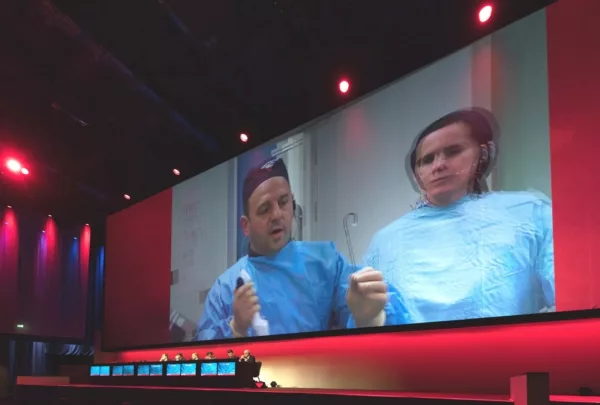EAU18 Scientific Programme: From precision medicine to future prospects

Organising a five-day congress with a Scientific Programme that addresses the extensive scope of international urology can be daunting.
Not for Prof. Arnulf Stenzl, Chair of the EAU Scientific Congress Committee, and his team who had brainstormed and planned for a seamless series of balanced, high-quality sessions that focus on the most current -if not controversy-ridden topics in modern urology.
“Every year is a challenge since we have to present in five days not only a broad range of topics we also have to make sure that we examine the most pertinent issues. We have invited international speakers whose research, opinions and expertise are among the best, and to assemble such a group is always a real challenge,” said Stenzl.
Compact, but comprehensive
With seven Plenary and 19 Thematic Sessions, the core Scientific Programme of EAU18 is a compact but comprehensive update on major urology topics. Emphasis is given on bladder and prostate cancer management with two plenary sessions. Plenary Session 2 is the Nightmare Session on Bladder Cancer Management, which follows the format in London, where three expert clinicians are cross-examined by a lawyer for possible clinical lapses.
On the other hand, prostate cancer management dilemmas will be the focus of Plenary Session 3 with case presentations that delve into oligometastatic disease, genomic screening and imaging-based biopsy, among other issues.
Precision Medicine is highlighted on Plenary Session 5 with case presentations and expert lectures that cover prostate and bladder cancer diagnostics. Also on the agenda are Hot Topics & Advances in Andrology (Plenary Session 1), Contemporary Storage LUTS Management (Session 4), Preventing Urological Disease: Future prospects (Plenary Session 6), and Stones for Plenary Session 7 which is held on the last congress day.
Thematic Sessions: Highlights
“I personally look forward to Semi-Live surgical sessions. Next year we have again the popular semi-live sessions where presenters bring their videos on which they comment on-stage and share insights from their own experience,” Stenzl said. “It’s different because these semi-live sessions focus on the technique itself with live documentation, discussions and live critique. And world-renowned discussants participate by giving their critique on the techniques shown on video.”
From the 19 Thematic Sessions, two Semi-Live meetings are in the agenda, namely Thematic Sessions 6 and 14. Thematic Session 6 presents techniques on robotic extended lymph node dissection for prostate and bladder cancer, robotic salvage radical prostatectomy and laparoscopic adrenalectomy. Pelvic Floor Surgery will be shown in Thematic Session 14 with international surgeons demonstrating innovative techniques in recurrent stress urinary incontinence (SUI) such as secondary sling and robotic burch procedures, and artificial sphincter in female patients.
New to the Thematic Sessions is Transgender Healthcare (Thematic Session 19) which will provide a thorough primer for the urologist with state-of-the-art lectures on psychological evaluation, gender-affirming endocrine treatment, vaginoplasty techniques, penile implants and penile transplantation.
“There is a wealth of topics up for discussion and complemented with update lectures in the Thematic Sessions such as the Overview of Fusion-Biopsy Devices (Thematic Session 8), with renowned experts giving state-of-the-art lectures,” added Stenzl. Underactive bladder, bladder cancer in the elderly, testis cancer, developments in imaging, end-stage renal disease and kidney transplantation, paediatric urology, challenges in upper urinary tract, and complicated urinary stone disease, are among the few issues to be covered in the Thematic Sessions.
Abstracts review: A difficult task
Aside from the challenge of presenting a solid and complete Scientific Programme, Stenzl noted the dedication of abstract reviewers.
“Every year we receive thousands of abstract submissions from all over the world and the numbers are increasing. Our reviewers judge them anonymously and have to make difficult choices and provide the opportunity to the most innovative, interesting and insightful studies. It’s a difficult task and we have to be objective as much as possible,” said Stenzl.
With the tough review process, the challenge for researchers is to submit their best work. The top-rated studies will be acknowledged by six awards in two categories, Oncology and Non-Oncology.
International, specialised and skills-focused
EAU18 also fulfils three main core goals— international, specialised and skills-focused. As in previous congresses, the Urology Beyond Europe Programme is a day-long joint meetings of the EAU together with national and regional associations which probes into shared clinical dilemmas and challenges. From Central Asia, Africa to the Middle East, international urology groups are well-represented in around 12 separate meetings.
Meanwhile, the EAU Section Meetings are expected to organise 10 meetings that individually examine current issues in various specialties. One of the longest in the programme is the nearly seven-hour Live Surgery session with a series of live procedures transmitted from a local host or expert centre, with the EAU Section of Uro-Technology as lead organiser.
To participants who aim to refine or acquire new surgical skills and education, the European School of Urology (ESU) has organised more than 50 courses, hands-on training courses and related workshops scheduled over three days.
With his myriad tasks to mount Europe’s biggest scientific congress in urology, Stenzl said his team has stepped up to the rigors of planning.
Asked what he considers the biggest challenge, Stenzl replied. “That would be to get the participation of the best speakers and to find exciting topics. We have to do that a year before and to identify the topics that will be interesting or actual in the years to come and that will define future issues— that’s not easy.”
Dates to Remember:
Early Fee deadline- 15 January 2018
Late Fee deadline- 12 February 2018
Congress days- 16-20 March 2018
Exhibition days- 17-19 March 2018